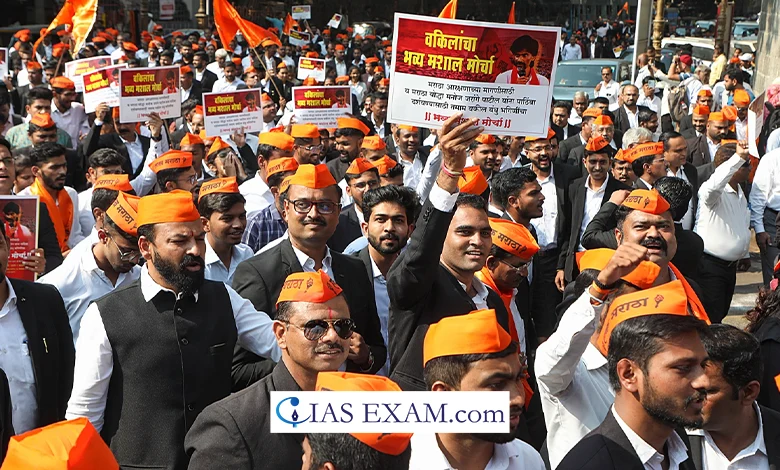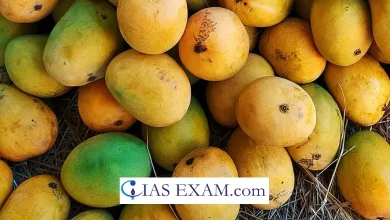Daily Current Affairs for UPSC
Shukre Panel on Maratha Reservation
Syllabus- Governance [GS Paper-2]

Context
Recently the Panel under Justice Sunil B Shukre has found an “alarming” rise in the girl child marriage rate among the Marathas, in response to the petitions challenging the 10 per cent reservation granted to Marathas.
About
- The Maharashtra Assembly unanimously passed a Bill granting 10% reservation in education and government jobs to the Maratha network.
- The law has been formulated based totally on a report of the Justice Sunil B Shukre-led Maharashtra State Backward Class Commission.
- It opined that “exceptional circumstances and extraordinary situations” justify granting reservation to the community beyond the Supreme Court-approved 50% limit.
Reservation in India
- As per current instructions, reservation is provided to Scheduled Castes (SCs), Scheduled Tribes (STs) and Other Backward Classes (OBCs) at the rate of 15%,7.5% and 27%, respectively, in case of direct recruitment on all India basis by open competition.
- In direct recruitment on an all India basis, apart from through open opposition, the proportion constant is 16.66% for SCs, 7.5% for STs and 25.84% for OBCs.
- The Constitution (103rd Amendment) Act 2019 permits the State (i.e., both the Central and State Governments) to provide reservation to the Economically Weaker Sections (EWS) of the society.
- Whether or not to offer reservation to the EWS or appointment in States is to be determined by the State Government.
- Since the 1992 order, numerous states have passed laws breaching the 50% ceiling, along with Haryana, Telangana, Tamil Nadu, Andhra Pradesh, Madhya Pradesh, Uttar Pradesh, Rajasthan, Chhattisgarh and Maharashtra.
- Laws made by many of these states have either stayed or are facing legal challenges.
Constitutional Provisions
- Article 16: It gives for equality of opportunity for all citizens but as an exception the State can offer for reservation of appointments or posts in favor of any backward magnificence that is not thoroughly represented inside the kingdom offerings.
- Article 16 (4A): Provides that the State can make any provision for reservation in matters of merchandising in favor of the Scheduled Castes and the Scheduled Tribes if they’re no longer correctly represented in the services below the State.
- Article 335: It recognises that special measures want to be adopted for considering the claims of SCs and STs to offerings and posts, in order to bring them at par.
- 103 Amendment of the Constitution of India: Introduced 10% reservation for Economically Weaker Sections (EWS) of society via amending Article 15 and Article 16 of the Constitution.
Arguments in Favour
- Caste-based reservations deal with the roots of social injustice — and shouldn’t get replaced by financial popularity-based reservations.
- The Constitution mandates realization of important equality in the engagement of the fundamental rights with the directive standards.
- It is a stereotypical assumption that the promotions drawn from the SCs and STs are not efficient or that efficiency is decreased by using appointing them.
- The fundamental motive for giving reservations or even promotions is that there are very few SC/ST candidates in the higher echelons of presidency.
Argument Against
- Reservations discourage benefit and true talent by presenting an unfair advantage to reserved applicants.
- Many deem poverty to be eligible for reservations in education and employment over caste-based marginalization.
- Reservations should only exist to level the playing field initially; they should be discontinued for higher positions/promotions.
- Economically well-off members of marginalized groups must not avail blessings of reservation.
- Low-cutoffs and eligibility criteria for reserved candidates brings down the overall caliber of an institution or organization.
- Continued reservation in education and public service were only a temporary measure.
Way forward
- Allocating quotas frequently bring about more cases of discrimination and tough emotions towards different communities. The cause of reservation isn’t to isolate a particular section but to make them a part of mainstream society.
- The policy makers while dealing with touchy matters like Reservation guidelines must act accurately.
Source: The Indian Express
UPSC Mains Practice Question
Q.Whether the National Commission for Scheduled Castes (NCSC) can enforce the implementation of constitutional reservation for the Scheduled Castes in the religious minority institutions? Examine. (2018)





.png)



